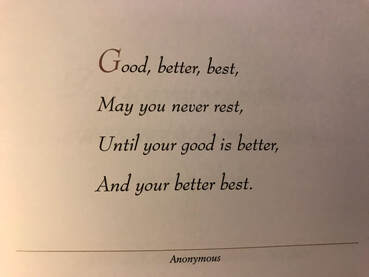
“Beauty is only skin deep.”
That’s what they say, and it’s true.
Substance is what’s most important,
But one should give beauty its due.
mbs
If you make breakfast for your kids, you're being a parent. If you make pancakes with strawberry eyes and a whipped cream smile, that's beautiful parenting. It's that little extra effort that stands out.
To me, beauty is the truest sign of caring! The beauty I'm referring to can be visual, of course, but it can also be an act, a thought, or an introduction of soul into a lifeless situation.
I’ve been fortunate enough to have visited Europe a few times. What really stuns me about that part of the world is the splendor of its architecture. There seems to be an appreciation for beauty there that is lacking in many US cities and towns. Cinder blocks can do an excellent job if all one needs is a reliable, safe structure, but it gives nothing to the soul. Any church, mosque, or synagogue will serve its congregation. But those structures that are magnificent bring a depth of meaning to worshipers that a converted strip-mall, storefront ‘house of worship’ cannot.
I visit coffee shops and see people come and go. I can’t judge them or know what they may have accomplished. I do notice, however, how they dress and carry themselves. I particularly appreciate a senior man or woman who takes pride in their appearance. It tells me something positive about them.
When watching homes being rehabbed on TV, I notice the rehabbers check the structure, heating, and cooling, etc. to be sure the house is safe and sound. The house is worthless if not safe and livable. But the house will go unsold until a designer makes it visually and emotionally appealing.
Art may serve to convey a message or capture a scene, but without beauty, or an attention-getting setting, any message will be lost , any scene unnoticed. Art serves beauty, and beauty serves art.
A rainbow has no substance outside of water molecules -- but rainbows are noticed! We can’t touch or use a rainbow; yet we watch them, sing and write about them, and see them as symbols of goodness.
The beauty of nature captures us all! The duty of a flower is simply to be pleasing to the eye. There is beauty in a desert, a wheat field, a canyon, or a mountain. But the more beautiful the scene, the more people search for and write about it.
There can be beauty in the spoken or written word. A speaker or author without this talent will go unnoticed. “I walk in the park,” gets across an action. But, “I often go to the park to watch people, to smell the grass, and throw rocks in the pond,” is deeper. The first sentence is the substance, but the second sentence places beauty within the substance.
I like to notice things. When the day is over, and beauty was a part of it, I am a much happier, richer person. So I say, “YES”! Beauty is only skin deep, but beauty is the icing on the cake, the sun shining through the flag, the glimmer of the lake, the smile on a child’s face, and the spice of my life.
So why do I talk about beauty?
This may not seem like a discussion about parenting and fatherhood. But it remains a lesson for this reason. There are practical and necessary responsibilities of parents that are basic and vitally important. However, to be a successful family you must bring beauty into your home! It is essential to show both substance and splendor as a parent. You should avoid being a 'rainbow mother' -- beauty with no substance. Nor should you be a 'cinder-block father' – protective, practical, and stoic. Instead, be that ‘work of art’ parent with a substantial and beautiful message to share. Or be a solidly built home with character and appeal making it a pleasant place to be. Write or speak words to your kids that excite them, challenge them, and encourage them. Mix those beautiful messages in with those soul-less messages such as, “Do your homework,” or “Clean up your room.” Balance!
Summary
Balance is a key maxim in parenting. As an example, a dad can be stern and maintain the love of his children if he has also revealed the beauty of his character. Being cheerful and fun is the beautiful side of parenting. Every facet of parenting has a responsible, substantive aspect that can be more effective with some beauty mixed in. We’ve seen and read too many stories where a father is at odds with his child, a child that he loves dearly. This occurs when there is no balance to the substantive parenting the father sees as his duty, resulting in a weak connection between the two. Without some beauty and love expressed in a family, the necessary and less enjoyable responsibilities of parenting will be much more difficult.
#powerofdadhood
Read, The Power of Dadhood, by Michael Byron Smith














